The Italian Verb Files
ESSERE
The Italian verb ESSERE is the next topic of The Italian Verb Files!
ESSERE means “to be” in English. Just like its English equivalent, it is used pretty much all the time in Italian!
Just like “avere”, it is also ESSENTIAL to making some compound (two part) Italian verb tenses! This makes it another must-know verb for everyone learning Italian.
So let’s learn about ESSERE! How is it conjugated? How is it used? Check it out below!

ESSERE - Italian Verb Conjugation Table
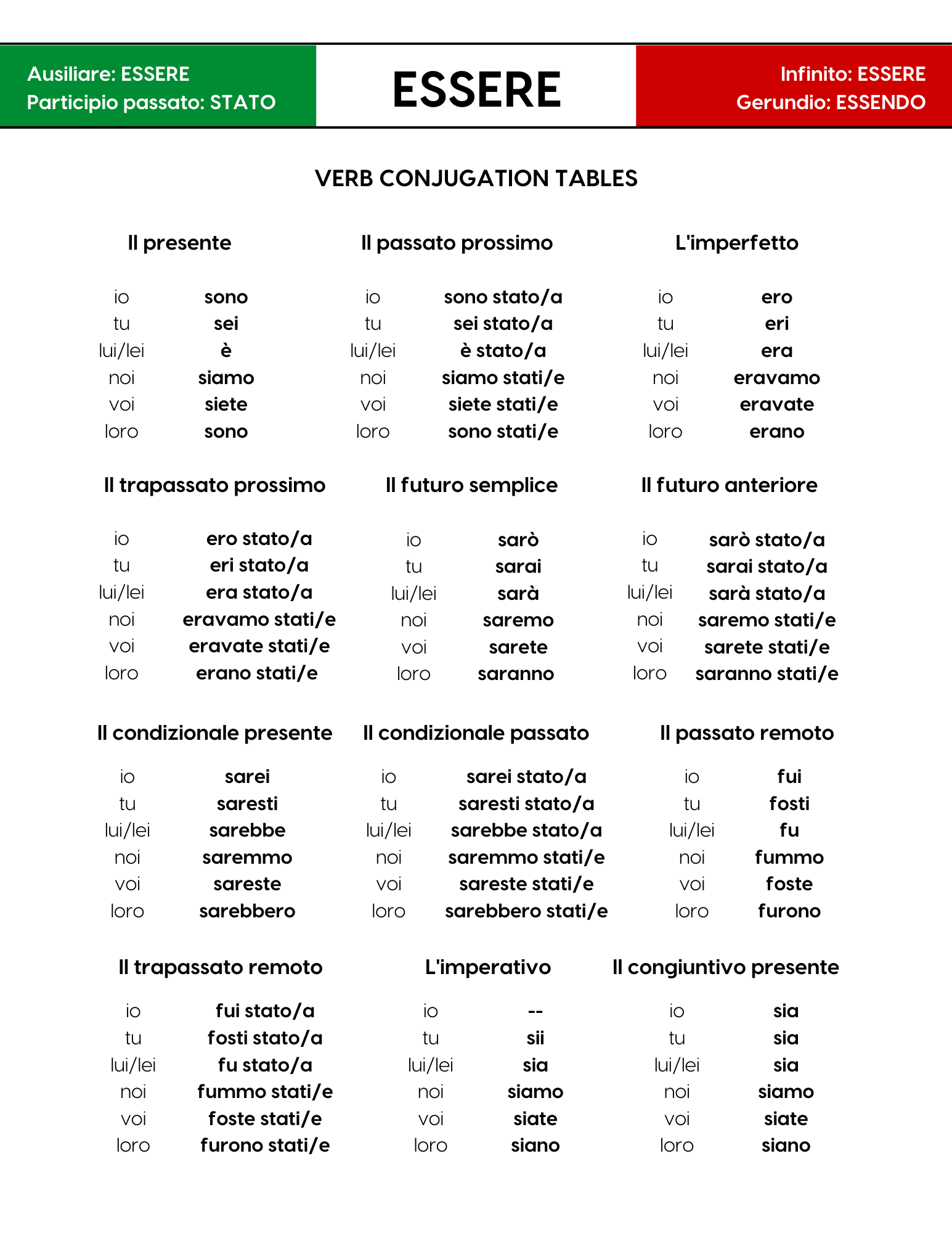
Click to download for FREE! — The Italian Verb Files – Verb Conjugation Essere
This Italian Verb Conjugation Chart with ESSERE shows you the most common verb tenses (3 more subjunctive verb tenses not on here).
Use it as a quick and easy reference sheet for your Italian verb conjugation!
Italian Time Expressions with "Essere"
The Italian verb ESSERE is used in many expressions about telling time.
NUMBERS 2 and ABOVE
When you are talking about a number that is 2 or above, you use the 3rd person plural (loro) form of the verb.
- Example: “It is 10 o’clock.” = Sono le dieci.
- Example: “It is 4 o’clock.” = Sono le quattro.
THE NUMBER 1 and SINGULAR TIME EXPRESSIONS
If the number you are talking about is 1 or a singular time expression such as “mezzanotte” or “mezzogiorno”, you use the 3rd person singular (lui/lei) form of the verb.
- Example: “It is midnight.” = È mezzanotte.
- Example: “It is 1 o’clock.” = È l’una.
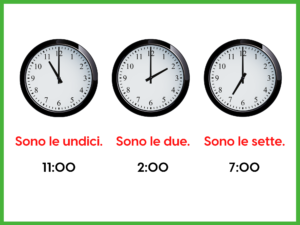
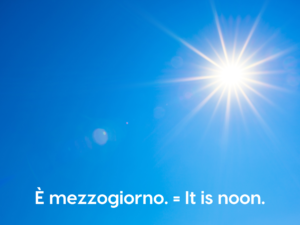
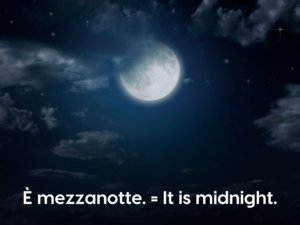
Italian Adjectives with the verb "Essere"
One of the most common uses of ESSERE (and the one that you will likely encounter frequently at the beginning of your Italian journey!) is with ADJECTIVES.
Describing people / places / things with ESSERE is a simple and effective way to make a description.
The key point to remember, is that the adjectives you use AFTER ESSERE must agree in number and gender with your subject!
These endings may be familiar to you from other Italian lessons, but here is the fast version:
- Masculine singular words = adjectives end in “o”
- Feminine singular words = adjectives end in “a”
- Masculine plural words = adjectives end in “i”
- Feminine plural words = adjectives end in “e”
**Keep in mind that there are MANY exceptions to this rule! You will want to go into detail with adjective and noun endings to make sure you have them down.
For now, we just want to keep in mind when you are making descriptions with the verb ESSERE, you need to adjust your adjective endings.
EXAMPLES:
- She is short. = Lei è bassa.
- The boys are happy. = I ragazzi sono felici.
- My grandpa is clever. = Mio nonno è furbo.
- The women are ready. = Le donne sono pronte.
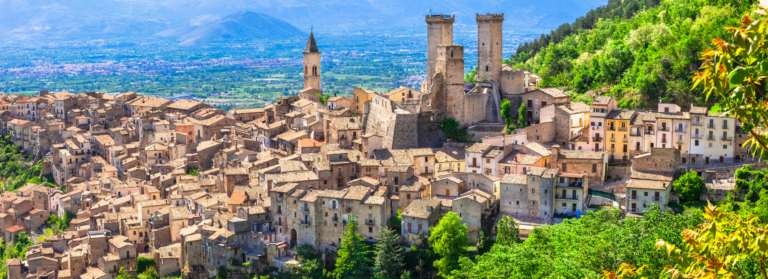
"Essere" as an auxiliary verb
If you haven’t encountered ESSERE used as an auxiliary verb, get ready! It will be coming up soon!
In compound tenses such as the passato prossimo, trapassato prossimo, futuro anteriore, etc. ESSERE is one of the two auxiliary verbs used to make the verb forms (the other is AVERE).
While the conjugation is different for all of these verbs, the verbs that use ESSERE are the same.
Most verbs use AVERE as their auxiliary. This makes it easy to form a list of the ones that use ESSERE!
Usually, these are verbs of movement (think DR & MRS VANDERTRAMP if you have studied French!).
Here is a list of the 17 most common verbs that use ESSERE as an auxiliary:
- andare = to go
- essere = to be
- stare = to stay
- partire = to leave
- arrivare = to arrive
- uscire = to go out
- venire = to come
- diventare = to become
- (ri)tornare = to return
- nascere = to be born
- morire = to die
- salire = to go up
- scendere = to go down
- entrare = to enter
- piacere = to like
- rimanere = to remain
- sembrare = to seem
Want a reference sheet? Download this list below for free – Click the link under the image!
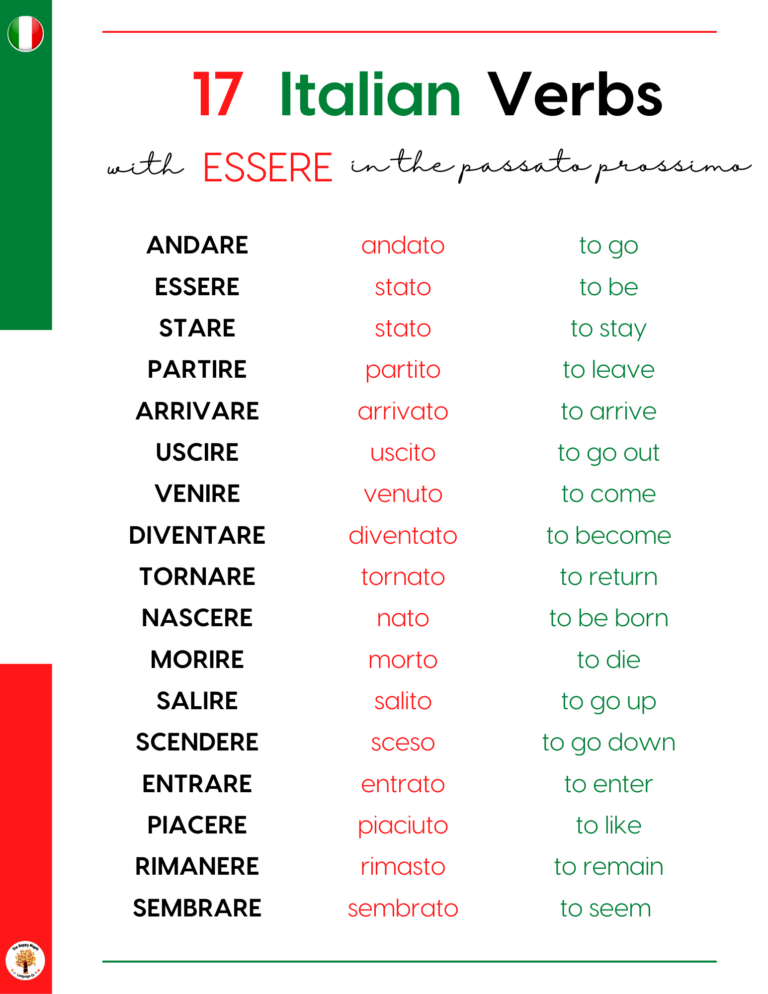
**Download link : 17 Italian Verbs that use ESSERE as an auxiliary verb
Italian Expressions and Idioms with "Essere"
Next up, we have some fun Italian expressions and idioms that use the verb ESSERE!
*Remember that in these circumstances, ESSERE may not always be translated as “to be”.
Let’s start our list!
- essere in alto mare (literally: to be in high seas) = to be lost / in difficulty / far from a solution
- essere al settimo cielo (literally: to be in seventh heaven) = to be very happy
- essere al verde (literally: to be at the green) = to be broke
- essere un carciofo (literally: to be an artichoke) = to be dumb / awkward
- essere alla mano (literally: to be to the hand) = to be down to earth / simple
- essere in gamba (literally: to be in leg) = to be capable / intelligent
- essere nelle canne (literally: to be in the reeds) = to be in trouble / broke
- essere a cavallo (literally: to be on a horse) = to be on top of things / to straddle
- essere alla frutta (literally: to be at the fruit) = to arrive at the end of something and there is nothing more to say / do (either through irritation or exhaustion) – A similar expression in English would be “I’m at my wit’s end!”
- essere un gioco da ragazzi (literally: to be a children’s game) = to be very easy
- essere tutto pepe (literally: to be all paper) = to be full of life / vibrant
- essere in un bel pasticcio (literally: to be in a nice pie) = to be in trouble / a mess (an English equivalent could be “to be in a pickle”)
- essere buono come il pane (literally: to be good as bread) = to be very kind / generous
- essere fuori di testa (literally: to be without a head) = to act crazy
- essere sano come un pesce (literally: to be healthy as a fish) = to be very healthy
- essere in erba (literally: to be in grass) = to be young / at the beginning of a career
- essere un polentone (literally: to be a polenta eater) = to be very slow
- essere un pesce fuor d’acqua (literally: to be a fish out of water) = to feel uncomfortable/ out of place
And that is the end of our ESSERE Italian idioms list! I hope that gives you some fun, new expressions to add to your vocabulary.
If there is an Italian idiom or expression with ESSERE that you love, let me know!

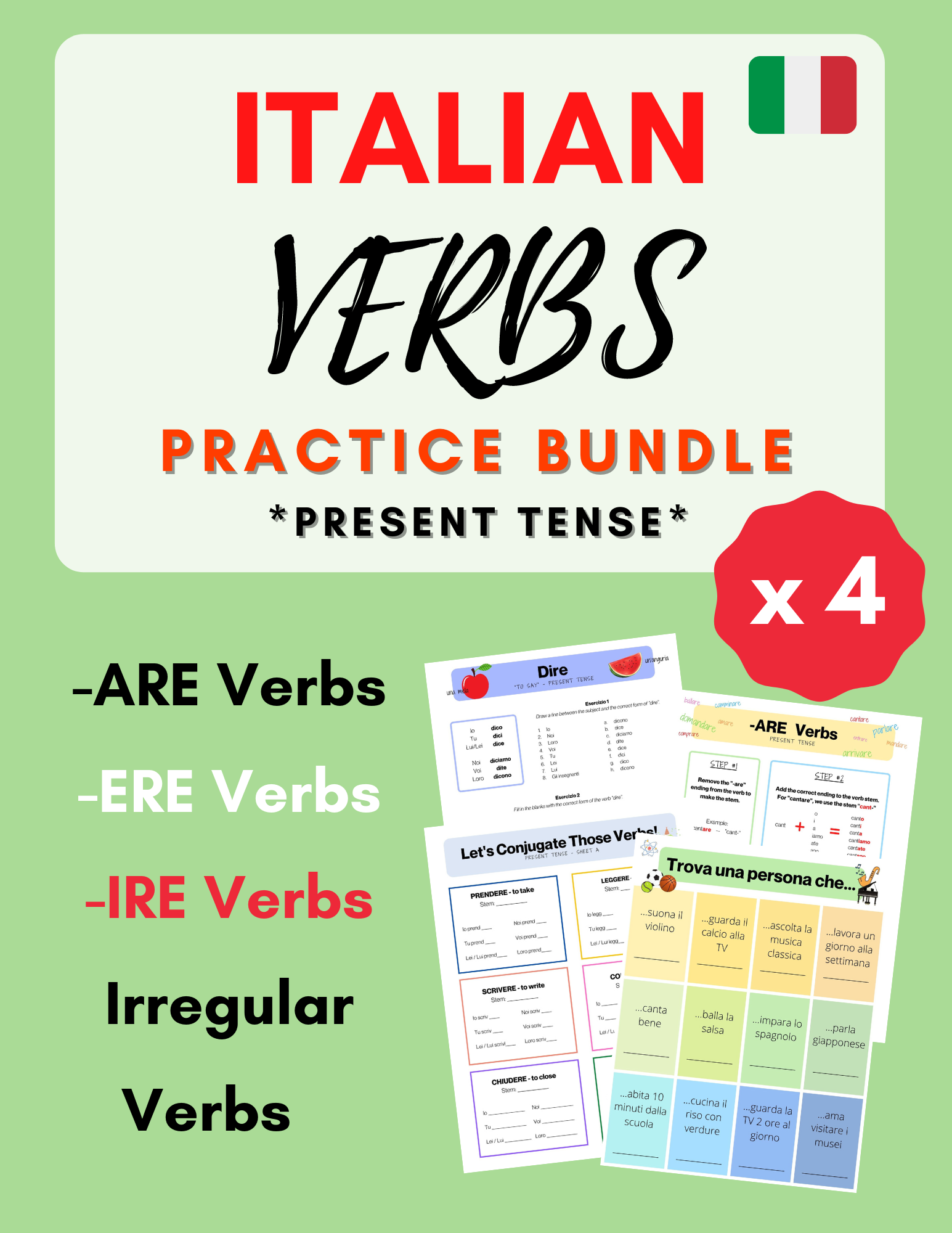

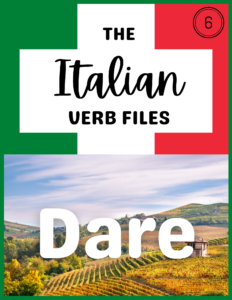

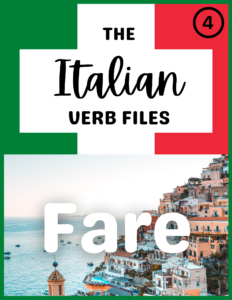
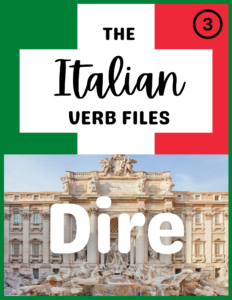
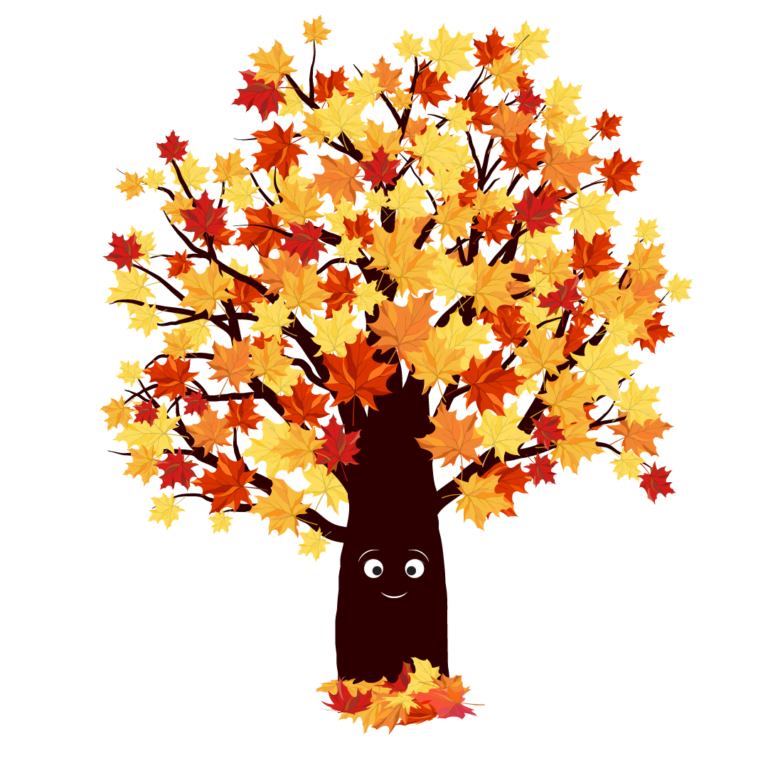




5 thoughts on “The Italian Verb Files – Essere”
Pingback: The Italian Verb Files - Dire - The Happy Maple Language Co
Pingback: 13 Must-Know Italian YouTubers for Learning Italian - The Happy Maple Language Co
Pingback: The Italian Verb Files - Fare - The Happy Maple Language Co
Pingback: The Italian Verb Files - Avere - The Happy Maple Language Co
Pingback: The Italian Verb Files - Venire - The Happy Maple Language Co